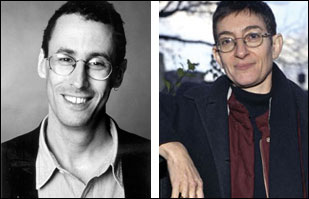I GUESS I GOT MY TERMS confused. I imagined “progressive” referred to the sort of activists behind, say, the new alternative Geneva peace plan, people looking to move beyond the shrill polarities of the Israel-Palestine debate to some fair-minded middle ground. But most of the “progressives” in Wrestling With Zion: Progressive Jewish-American Responses to the Israeli-Palestinian Conflict (Grove Press, $12.95), edited by playwright Tony Kushner and Village Voice theater critic Alisa Solomon, are instead far-lefties, intent on rebutting the perceived one- sidedness of Jewish establishment opinion with an equally one-sided, and familiar, anti-Zionist slant: Israel is roughly equivalent to the Third Reich, and the only thing standing in the way of Palestinians fully realizing their deepest aspirations is Israeli cruelty and intransigence (never Arab crimes, failures, and corruption). In that respect, Zion wrestles its way to a predictable rout.
Yet this anthology of some 50 essays (plus poetry and a roundtable) is still a gripping, ambitious, valuable rout, arousing contempt, admiration, anger, wonder, and all the responses strong writing provokes. I’m not equipped to engage every point of interpretation or fact (though if, as Naomi Klein contends, “children all over the occupied territories are being named Rachel”after bulldozed activist Rachel Corrie from Evergreen State CollegeI will eat my skullcap); but I was pleased to find them widening my perspectives, however dubiously.
When Adrienne Rich writes that American Jews “have paid an intellectual and spiritual price for the narrowing of sight demanded by conformity and reliance on Israel as surrogate identity” and that “part of this price has been estrangement of many Jews from any Jewish affiliation,” I’m not sure the situation isn’t exactly the reverse; but it’s an important idea to consider. Similarly, you can’t help but pause to reflect when longtime Village Voice essayist Richard Goldstein compares Israel to the phallus”I hate it, I want it; I have it, I don’t. I attack it, yet I’m afraid to live without it.”
MOST WRITERS HERE are guided by a fundamental suspicion of nationalism (except, of course, the nationalism of those who have no nation; that they heartily support). Many are rehashing arguments that were raisedand then set aside by historyin the decades leading up to the establishment of the state of Israel, but which now have painfully strong resonance again. Among the many troubling questions is whether the state of Israel, and the grievous suffering it has afflicted on the Palestinians, is undermining Judaism in a larger sense, is ultimately “bad for the Jews.”
The brilliant I.F. Stone is quoted, writing in 1967, “In the outside world, the welfare of Jewry depends on the maintenance of secular, nonracial, pluralistic societies. In Israel, Jewry finds itself defending a society in which mixed marriages cannot be legalized, in which non-Jews have a lesser status than Jews, and in which the ideal is racial and exclusionist.”
For an example of how those pre-1948 ideals have become debased, there’s the account of Sara Roy, a research scholar at Harvard and the daughter of Holocaust survivors, who eloquently, unapologetically compares the treatment of one elderly Palestinian manforced, she claims, by Israeli soldiers to kiss a donkey’s behindto the behavior of the Nazis. “What happened to the old man was absolutely equivalent [to the Nazis] in principle, intent, and impact: to humiliate and dehumanize.” This is absurdly overstatedpolice actions are frequently meant “to humiliate and dehumanize.” Does that make King County jail guards the “equivalent” of genocidal maniacs? Still, it’s these sorts of episodes that, understandably, send the Rachel Corries of this world to the Gaza Strip and West Bank.
NOT UNTIL PAGE 226, in the excellent essay by NYU cultural critic and former Voice writer Ellen Willis, do we arrive at a clear-eyed puncturing of some leftist canards. “It’s impossible not to notice how the runaway inflation of Israel’s villainy aligns with ingrained cultural fantasies about the iniquity and power of Jews,” she writes. Equally acute is a piece by The Nation‘s Philip Green, who argues that rabid lefty critics of Israel are propelled not by anti-Semitism but by a fixation on American imperialismof which Israel is the “chief benefactor” (sicI think he means “beneficiary”) and “most visible outpost.”
Inasmuch as Zion intends to combat what the editors call “a dangerous illusion [that] the Jewish-American community speaks with a single voice,” it would seem like unnecessary effort. Jews speaking with a single voice? Rim shot, please. Anyone who might conceivably read this book surely already knows that far-left Jews, from Chomsky on down, have been among the harshest critics of Israel. Still, without doubt there has been some circling of the wagons among Jewish institutions and interest groups. Here in Seattle, a pro-Israel rally last year became a scandal of sorts when clumsy efforts were made to silence anti-occupation protesters.
Despite this, I’m not terribly concerned that “the centuries-old Jewish traditions of lively dispute and rigorous, unapologetic, skeptical inquiry” are in serious danger, as the editors here suggest. Indeed, Kushner and Solomon’s anthology, for all its frustrating biases, is a rewarding and intelligent exploration of some of Judaism’s many internal conflicts. It gives a vigorous counterweight to the notion that Jews are falling into line. Even with all the moral opprobrium here heaped upon Israel, I can’t help but wonder if Israel is, in fact, the key to maintaining the disputatious tradition these editors love. Were there no homeland to which all Jews are free to return, how confident would these writers really feel in so loudly proclaiming their dissent here in America?








